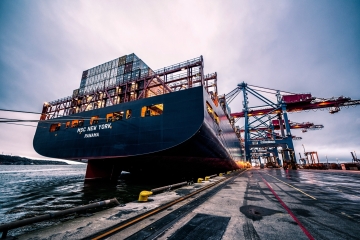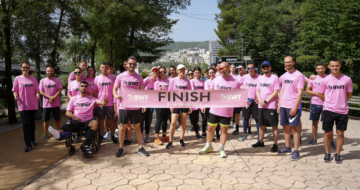VIL tests concept 'Physical Internet' in ports of Antwerp and Zeebrugge

Innovation platform for logistics VIL is working with imec and VUB Mobi on a pilot project to test the Physical Internet (PI) concept for transport in the ports of Antwerp and Zeebrugge.
Innovation platform for logistics VIL is working with imec and VUB Mobi on a pilot project to test the Physical Internet (PI) concept for transport in the ports of Antwerp and Zeebrugge.
According to this principle, logistic processes and networks are bundled, allowing goods to be transported in an optimal way.
The Physical Internet is an idea to organize transport according to the principles of the digital Internet: instead of a fragmented landscape in which each transport company goes its separate way, a bundled network is created to transport all goods as quickly and efficiently as possible. "In the same way that an email uses the full network capacity to go from sender to receiver, goods should use the full capacity of the infrastructure," says Tomas Ambra, Research Director for Logistics at imec EDiT.
The end result is an integrated solution where all modes of transport can be deployed in combination. "The PI opens the door to numerous new logistics business models in which an umbrella IT system shows logistics service providers opportunities in terms of collaboration, and the more efficient use of available personnel, assets and transport capacity. As a result, it will make a significant contribution to reducing logistics costs, making the logistics sector more sustainable and increasing service levels", says Liesbeth Geysels, General Director of VIL.
Within the PILL (Physical Internet Living Lab) project, VIL, imec and VUB Mobi are now going to work with more than twenty partners from the logistics sector on PI in the ports. In Antwerp and Zeebrugge an IT prototype will be tested to unify the processes of the many companies in and around the ports.
Initially, PILL will be limited to the port ecosystems. From 2023 onwards, the initiators want to roll out the concept further in Flanders, Europe and eventually the whole world.
Latest insights & stories

A Global Movement: The World Unites in a Pink Pledge for Clean and Sustainable Water
5,000 participants. 32 countries. €30,000 funds raised. And that's just the beginning.
Picture this: One step that sends ripples across the globe, transforming lives and creating waves of change. You might wonder, how can such a simple action for most of us have such a profound impact?

Sustainability and circularity in construction
Join us in transforming the future of construction, creating buildings that not only stand the test of time but also contribute to a healthier planet!

RainTunes: Shower scenarios for the soul
Light, hearing, smell, and touch: Together with experts, we have developed sensuous scenarios that turn showering into an individual experience. Whether you want to prepare for the day ahead or relax after working out. Whether you want to refresh after a day’s work or unwind at the end of the evening: RainTunes surprises with multisensory experiences.*
*Currently available only in Germany and Austria.